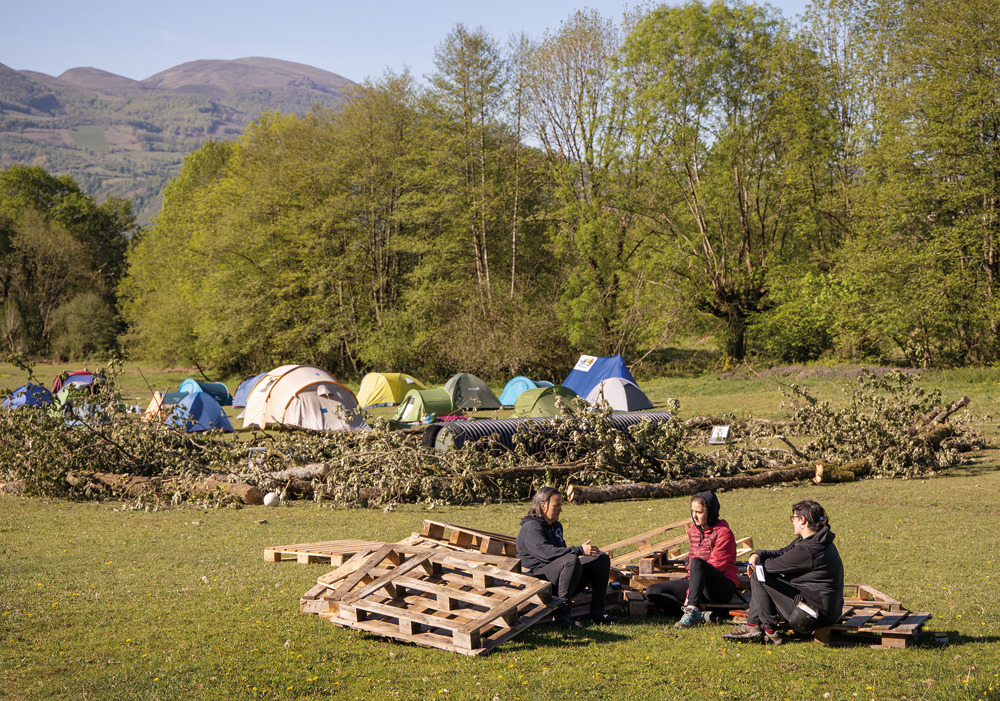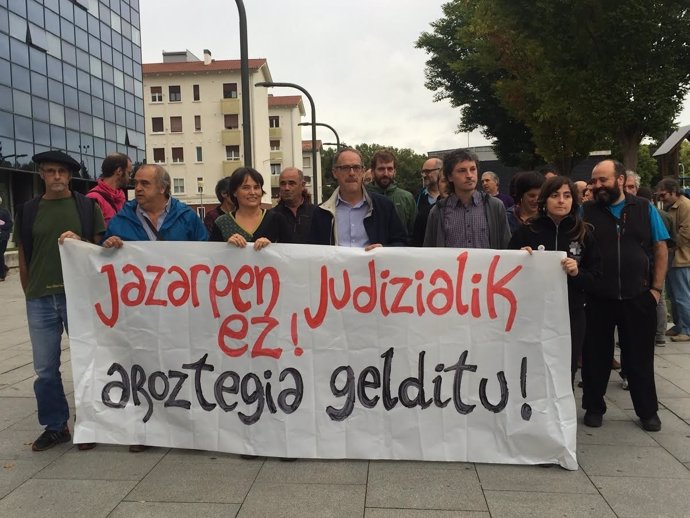"Camping is a new format of assembly and auzolan"
- We interviewed two legaroztarras members of the movement in the camp itself: Garbiñe Elizegi Narbarte and Aintzane Ariztegi Barrenetxe. The first has been and continues in the long battle of twenty years, and the second, newborn in 1998, when the first project came out, is in the middle of the fight against the project. Two members of different generations in the same struggle.

You're wearing resistance camping just over a week. What valuation do they make of this?
Aintzane Ariztegi: We're strong and we've met a lot of people this week, people who are still here every day. From Baztan and from all over Euskal Herria we are receiving solidarity, and we perceive that we have more and more support and that our struggle is echoing. We are happy with that.
What is the philosophy of popular initiative and the Aroztak camp?
Garbiñe Elizegi: Disobedience is now our way, because all other paths are exhausted. During all these years we have tried to paralyse the project in a different way, without using force and with the least possible risk to us, but we have not been heard. In these times when attempts are being made to curb popular protests and movements in the name of social peace, we have decided to launch the camp of resistance. We haven't theorized too much about our philosophy, but in daily practice we have tools like assembly and neighborhood work, because that's how we've grown and it's the basis of our culture. Therefore, this camp can be considered a new format of assembly and neighborhood work, and mutual vigilance is always taken into account.
The coronavirus has made it very difficult to organize the camp and attract people…
R.V. : It is true that there are people who do not see the situation coming here. We understand it, and there's also work to be done from the outside, so there's no problem. Here we have taken into account from the very beginning the coronavirus situation; if either of them is in danger or has touched him in a case in his environment, he has to leave. In the camp we also have quick tests so that when someone has any suspicion they do so as soon as possible. However, we, in addition to the current pandemic, also see the health impact of projects such as Aroztegi. That is why we say that here we take care of our health not only by taking the necessary measures, but also by taking care of our environment. In short, here we are fighting for life.

How do they work and what does everyday life look like here?
A.A: We organize through shifts, every day people change, they don't repeat and they get involved in the new people that come in. There's food shifts, cleaning up the things we get dirty, distributing food and maintaining the orderly environment, for example. To decide things we have the daily assemblies, where the shifts are distributed, resistance is organized and the following steps are defined. On the other hand, every morning when the works begin, we are all prepared to approach the necessary place and stop the machines.
And from a linguistic point of view, how are they adapting to meetings?
R.V. : We do everything in Basque. Lekaroz is an Euskaldun people and one of the pillars of our struggle is the Basque. Among the arguments to oppose this project is language, since the damage that this type of urbanization and macro-projects cause in the respiratory areas of the Basque Country is demonstrated. Therefore, in the assemblies – and if not – we function in Euskera, both inside and outside the camp. When Spanish and French speakers arrive, we told them to look for a translator among us, and they had no trouble finding whispers.
They separate the camp “inside” and “outside”. There's a whole network that's also organized outside here, right?
"The path that interests the system is to turn the rural environment into an animal free time park and not a place where citizens can live sustainable
lives" Aintzane Ariztegi
A.A: Yes. Because of the coronavirus issue, because of each other's petsonal limitations, or the way they understand the struggle, there are people who don't come to camp but who are participating in a different way. To be part of this you do not need to spend here two weeks in a campsite, where there are the people who make food shifts and the whole network that protects us from the outside, who are working for us to be camping here. All this care is our support, without that we could not be here.
Many people and agents outside Baztan and Lekaroz have joined the fight.
A.A: At first we were people here, but we saw that we had to measure our forces, and because it's a long-term thing, we also needed external protection. We have made a proposal to bring together various agents of the popular movement in Navarre, who are initially opposed to reducing projects and to the protection of the environment and the rural environment, but then to others. In the end, this is not just a fight for the environment, it is a fight against a model of society that leads to the accession of many different actors. In Euskal Herria Euskaraz, for example, has drawn a sign to support our struggle, from there we go to Bilgune Feminist, going through the fight against the VAT…
R.V. : Well, for us, the struggle is unique. It is not a struggle for the environment, another is a feminist, another is a Basque… All that is us. But it's true that this project crosses us on many sides, so we're people from different groups.
Should we therefore understand what is happening here as a clash between opposing life models?
A.A: We must understand what is happening in Baztan as one more branch of the development of a broader process and a model of society, yes. The rural environment and sustainable life have no place in this system, and each year these diminutive projects are accelerating this process. Baztan has chosen to focus the whole economy on tourism, regardless of whether that tourism has no borders. It seems that it is our only way out and support. Meanwhile, other processes are taking place here: agriculture and life in the people are being lost, there are few young farmers, there are huge problems with housing and work… The path that interests the system is that the rural environment becomes a park for the free time of the farmers and not for their inhabitants to live sustainable lives.
R.V. : They want us to believe that it is not possible to live outside urban life, that our culture and our language have no value. The things necessary to sustain life have been disvalued: care, woman, land, agriculture, collective, assembly, neighborhood work… We have to turn it around. To those who say that in Baztan there is room for everyone we say no, that not all things are compatible: that here 228 homes are built for the Castilian speakers who have come from the city and that Lekaroz will be Euskaldun. That is false.

They are receiving police visits on a daily basis. How do you take it?
A.A: The police presence is constant, has sometimes reached the camp area and the area is constantly being monitored. They are particularly concerned with the movement between the camp and the outside, which also includes the people, who for a moment have been almost besieged by Lekaroz, that there are daily controls on the entrance and exit of the people, and that the citizens have also said that they are up to that presence.
R.V. : A government cannot be allowed to use all these resources to defend the barbarity that a private company wants to do. The defence of capital is being carried out in an entirely irreverent manner. Why are public resources being spent in this way, why should the people be permanently harassed?
Perhaps their goal is to tire the population and oppose the camp…
A.A: Well, I think you're getting just the opposite.
R.V. : I believe that, despite the fact that for years people have been against the project, since they have seen their oak and trees physically sting, pain and anger are more present.
A.A: Yes, the feeling is that our people will never be what we have known so far, and that creates a lot of pain for people. So far, maybe you didn't see it, or some people would think it wasn't going to be done. It is now becoming a reality, and that truth is becoming a pain for the citizens.
At what point are the works?
"Here we take care of health in two ways: not only taking the necessary measures, but also taking care of our environment. In short, we are fighting for life"
Garbiñe Elizegi
R.V. : They haven't advanced too far, but it's true that one excavator and four chainsaws can do a lot of killing in just a few days. All the trees at the entrance have been knocked down and at the top have made a clue. The first few days we were coming to the works, but to reach us in the afternoon they had already worked all morning and had torn down the trees. Then, in the area of Telleria, a very symbolic place for the people of Lekaroz, where we had many meals at the parties, they started throwing the oak trees, and then we said: ready, enough, we don't let them throw a tree anymore!
They have also denounced that the company TEX is carrying out work in an irregular manner.
R.V. : Yes, they have said from the City Hall that they do not have permission to be here right now. Despite the fact that the project is declared as UGPS, there are authorizations that the City Hall must grant and with which there have been problems. On the other hand, the hermitage situated on the grounds has not been expropriated, has been claimed by the City Council and is in the courts. In addition, the project did not meet all the criteria and social clauses that had to be met by the VPL; the LAB union appealed and the judgment declared that the award was annulled. In any case, we say that we do not care whether or not they have permission: the only thing we will accept is the suspension of the PSIS.
You've called unlimited camping and you've got more and more protection. Is there any real possibility of paralysing the project?
R.V. : Yes. This project can, must remain and will stop. It is clear to us that this is a struggle for life, that it would condition our lives and that it is very important to win. We'll be here until the project stops, we don't know about camping or other ways, but that's the only option we have left.
Aroztegia proiektuaren kontrako protesta baketsuetan parte hartzeagatik ezarritako zigorrari aurre egiteko diru-bilketa abiaraziko dutela iragarri du herri kolektiboak.
Elkartasunez, hamarnaka herritar elkartu dira Nafarroako Auzitegiaren aitzinean, "herri baten borondatea ezin da epaitu" banderola plazaratuz.
Aroztak Herri Ekimenak jakinarazi du sei pertsona epailearen aurretik igaro beharko direla, Aroztegiako makroproiektuaren aurkako protesten harira. Ekimenak babesa helarazi die, eta mobilizazioak deituko dituela iragarri.












.jpg)








